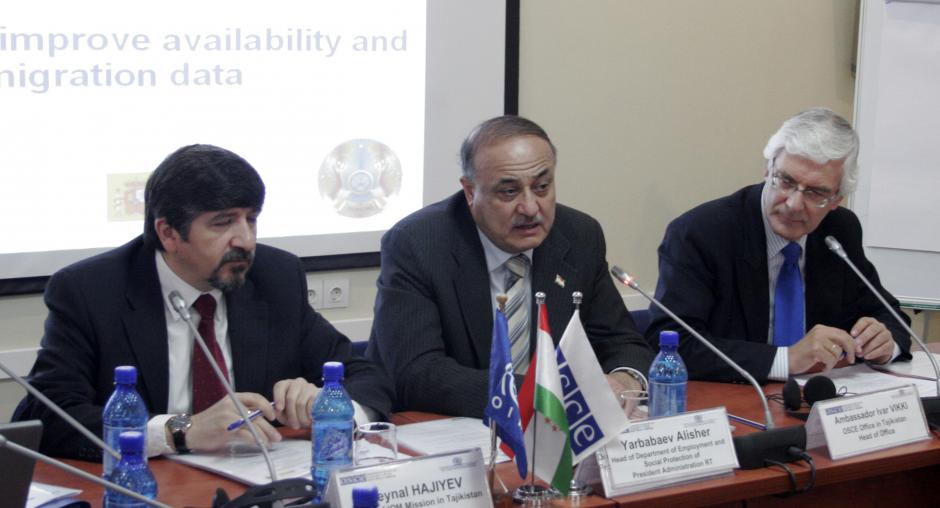OSCE presents study on migration data in Dushanbe, discusses steps to harmonize data collection

DUSHANBE, 20 January 2011 – The preliminary findings and recommendations from an assessment of Tajikistan's collection of migration data by the OSCE and the International Organization for Migration (IOM) were presented to policymakers and data users at a meeting in Dushanbe today.
The assessment is part of a bigger project supporting the establishment of a harmonized data collection process in Kazakhstan, Kyrgyzstan and Tajikistan.The event was organized by the Office of the Co-ordinator of OSCE Economic and Environmental Activities and the OSCE Office in Tajikistan in co-operation with IOM.
Government officials and policymakers discussed issues including internal and external migration data needs and the steps needed to harmonize data collection between Kazakhstan, Kyrgyzstan and Tajikistan.
Yarbabaev Alisher Izatulloevich, the Head of the Department for Employment and Social Protection of the Presidential Administration of Tajikistan, presented the links between the country’s economic and demographic situation and the labour migration phenomenon. Moreover, he called for more reliable migration data that will enable Tajikistan to make more accurate economic analysis, which in turn would result in more effective labour migration policies.
Ambassador Ivar Vikki, the Head of the OSCE Office in Tajikistan, said at the opening of the meeting: "This OSCE-IOM project is an important step forward to achieve harmonized migration data collection process in the region. Moreover, as called for in the 2009 Athens Ministerial Council decision on migration management, it will help to improve the collection of comparable data on migration in order to facilitate dialogue and exchange of practices at the OSCE level."
Zeynal Hajiyev, the Head of the IOM Mission in Tajikistan, said: “The assessment of the migration data collection mechanisms in Tajikistan and other countries of the region will contribute to formulation of well informed migration policies at national and regional level. It will also help identify priority areas of further capacity building support to concerned state structures in establishing standardized procedures for collection, analysis, reporting, and inter-agency as well as inter-state exchange of migration data.”
The meeting was part of a country assessment trip in Tajikistan. Further country assessments and similar meetings will also be held in Kazakhstan and Kyrgyzstan. To ensure synergy with other data collection processes, activities are being co-ordinated with other international organizations including the United Nations Economic Commission for Europe, the International Labour Organization and the Population Division of the UN Department of Economic and Social Affairs.
The findings of the three country assessments, a template for data collection and general conclusions and recommendations will be compiled in ahandbook, whichwill be presented at a regional conference in Vienna in June.
